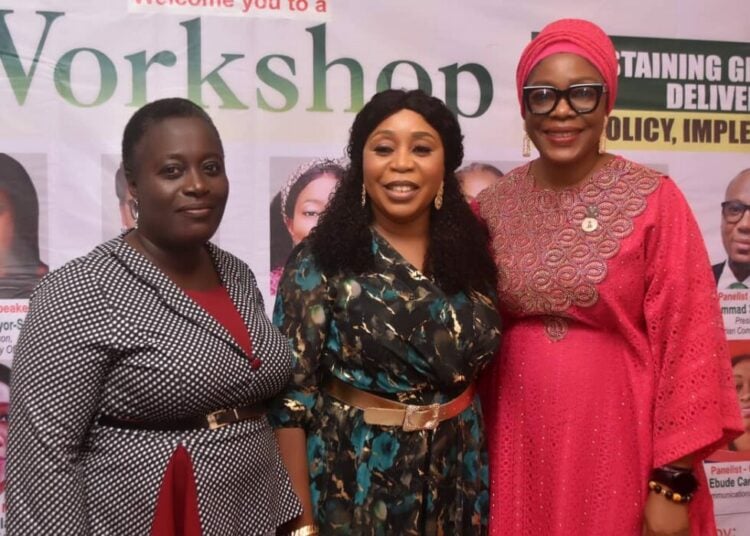Infrastructure experts, government officials, academics, and development practitioners, have stressed the urgent need for Africa to integrate women’s voices in infrastructure delivery, warning that exclusion risks undermining sustainable growth and deepening inequality.
The call was made at a high-level workshop themed “Sustaining Gender Lens Infrastructure Delivery Agenda in Africa: Policy, Implementation & Partnerships,” convened by the Women in Construction and Architecture (WICA) in collaboration with the Centre for Housing and Sustainable Development (CESD), ARUA Centre of Excellence for Urbanisation and Habitable Cities at the University of Lagos.
The gathering brought together stakeholders from Nigeria, Zambia, Malawi, Ghana, Tanzania, and Cameroon to explore strategies for mainstreaming gender in infrastructure planning, design, procurement, and policy.
Delivering the welcome address, Convener and President of WICA, Dr. Olajumoke Akiode, said infrastructure is never gender-neutral and must be designed to reflect the different realities of men and women. She noted that the objective of the workshop was to examine the “where” and “how” of gender policy implementation and forge partnerships to embed a gender lens in infrastructure delivery across Africa.
“We must commit to creating a monitoring, evaluation and benchmarking template to ensure the gender lens infrastructure agenda for Nigeria and Africa has the right policies driving them, the collective will to implement them, and the partnerships to sustain them beyond our lifetimes,” she urged, calling for continental collaboration.
Guest speaker and Director at the Federal Ministry of Housing and Urban Development, FCT Abuja, Chioma Wogu-Ogbonna, emphasised bridging the gap between policy and practice. She pointed to the need for participatory design to capture women’s voices, gender-responsive procurement policies that allocate a quota of contracts to women-owned firms, and targeted capacity-building for engineers, architects, and policymakers.
“When women were consulted on the location of rural bus stops, incidents of harassment dropped significantly and mobility improved,” she said, urging governments to institutionalise such inclusive planning.
The Director of the Centre for Housing and Sustainable Development, ARUA Centre of Excellence for Urbanization and Habitable Cities, University of Lagos, Prof. Timothy Nubi, also stressed the urgent need for gender-conscious infrastructure development in Nigeria. He noted that while infrastructure development is vital for economic growth, it often has uneven impacts across society, with women and girls disproportionately affected.
“Integrating gender considerations into infrastructure planning is not just fair, it is essential for promoting economic empowerment, safety, and social inclusion,” Nubi stated.
Recommended strategies include designing infrastructure that prioritises women’s safety, promoting their participation in project planning and implementation, providing training and capacity-building opportunities, and monitoring the social impact of projects.
“Gender-conscious infrastructure development is key to building inclusive cities and boosting national productivity,” he added.
The President of the Federation of Construction Industry, Vincent Barrah, was also at the event to drum support for inclusive infrastructure development across the continent. Stakeholders noted that governments must provide enabling policies and budgetary allocation, while the private sector should drive investment through gender-smart financing, and civil society must hold stakeholders accountable.
Barrah said there is progress in gender policies, with donor-backed projects attempting inclusion and advocacy gaining strength.
“But there remains a disconnect between policy and implementation. Too often, gender-inclusivity is treated as a box to tick in project proposals, not as a core philosophy that guides design, budgeting, execution, and evaluation. Infrastructure that ignores women is not neutral — it is biased, it is exclusionary, and it deepens inequality,” he warned.
From Zambia, Coordinator of WICA Zambia Chapter, Dr. Chishimba Kathryn Mufana, emphasised the importance of cross-country collaboration and knowledge exchange to tackle common challenges in architecture and engineering.
Representing Tanzania, Ester Christopher discussed the country’s revised Construction Industry Policy 2025, which now embeds women’s inclusion in procurement.
“Women contractors are being awarded major projects, showing that policy shifts can translate to real opportunities,” she said.
Also, the immediate past President of the Malawi Institute of Architecture, Catherine Sani, stressed that while national gender policies exist, implementation within the construction industry remains weak, resulting in poor outcomes for women.
President of Women in Engineering, Ghana, Ing. Naki, called for strengthening gender-responsive frameworks specifically for infrastructure sectors.
“General gender policies are not enough. We need frameworks that are customised for transport, water, energy, and housing,” she argued.
Participants from Cameroon also shared experiences on how poor representation of women in planning processes continues to marginalise communities.






